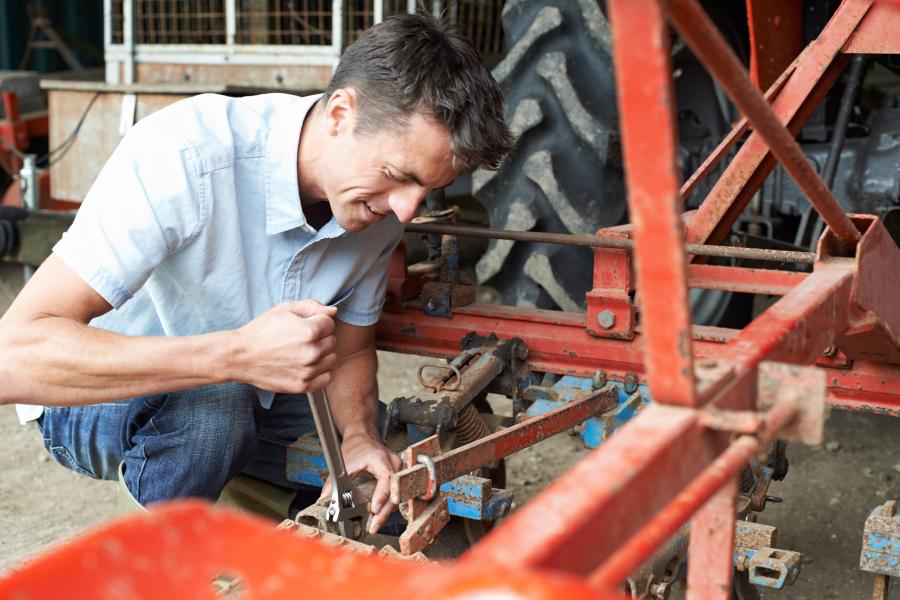These five maintenance tips will allow you to significantly increase the life of your farming equipment. This, in turn, improves the return on investment for heavy machinery purchases.
A lot of people fail to realize the importance of paying close attention to the maintenance of farming equipment, which can do more harm than good in the long run, considering how failing farming equipment affects productivity and the quality of yields obtained. If that is not enough, farming equipment will break down more often, which can cost a fortune in the form of repairs and/or replacements. Furthermore, safety becomes a huge concern if things are allowed to remain as they are.
If you wish to change things for the better, but are not sure where to begin, here are 5 maintenance tips to extend the life of farming equipment you own, without any hassles whatsoever.
1. Train and Learn More About Different Machinery
Different kinds of farming equipment require different types of operators. For this reason, it is always a good idea to learn as much as you can as a machine operator. By doing so, you ensure the correct operation of different equipment.
As soon as you get new machinery, you should indulge in operator training, and then keep yourself up-to-date with new developments as they come. If your skills become rusty, it will affect your equipment's performance.
For different work situations, take the time to revisit operator manuals, just to be on the safe side. Enough emphasis cannot be placed on the fact that you should use the most current version of manuals available for the best possible results.
2. Try Different Lubricants
With a good schedule for lubricant replacement, you can substantially extend the life of machinery and equipment you own.
When it comes to maintenance checks, lubrication is the most important factor of them all. Be wary and look out for grease build-up and excess oil on pistons. Also, make it a point to look for leaks on oil seals.
Speaking of lubricants, always use the right one. Every component requires specific kinds of grease and oil, for which you will need to check what the manufacturer recommends in the first place.
If you do come across problems with machinery you own, get the lubricants checked or contact the manufacturer. It will help you diagnose the problem since experts will analyze the used oil with particles therein. Based on the makeup of contaminants, it will be easy to pinpoint what part of the machine, in particular, is suffering from wear.
3. Keep Your Farming Equipment Clean
Check the seals on your equipment regularly to make sure they are in excellent condition, and check and replace filters often.
To avoid a vacuum in the cab that usually sucks contaminants, make sure you clean the breathers every chance you get. Since the pollutants negatively affect the electronics in the cab, and even components like the clutch, regular cleaning is essential.
When not in use, large machinery should be stored in a secure and sheltered location to protect it from rust and other environmental damage. Even if the machinery you own is not going to be used for extended periods, it should occasionally be used so it does not die out for good.
4. Assess Equipment for Wear
High temperatures, shock, friction and vibration contribute to the degradation of parts in heavy machinery. Unless you want to have to spend more on a crucial repair job, assess equipment for wear beforehand and deal with it accordingly.
Some common reasons why problems occur:
- Vibrations, in most cases, are caused when belts and gears are out of alignment.
- Shocks occur due to accidents or poor operating practices.
- High temperatures are caused by extended use of machinery, worn parts, inadequate lubrication or excessive friction.
- Many key components are affected by age. After some time, seals will crack and dry, belts will twist, bolts become loose and more.
Should you come across any wear and tear in the machines you own, deal with them as soon as possible before things become worse than they already are.
5. Maintain a Schedule of Maintenance and Repairs
As a part of a preventive maintenance plan, electrical systems, tires, fluids, and tracks need to be checked regularly. It is crucial for you to know what component needs to be inspected when and where.
Some final tips:
- Change filters regularly. Diagnose problems by testing the oil.
- Frequently oil your machine's gears.
- Avoid bearing raceway contamination by doing a seal check.
- Check gearboxes for vibration, lubrication and damages, if any.
- Continuously monitor drivetrain components. Check for wear and alignment of v-belts and pulleys on CVT transmissions.
- Since bolts can creep and elongate over time, run regular torque checks.
These five maintenance tips will allow you to significantly increase the life of your farming equipment. This, in turn, improves the return on investment for heavy machinery purchases. There are many other tips out there that can be taken into account to extend farming equipment life, and you should not hesitate from implementing them as well, but only as long as they make sense.
As the world moves toward global manufacturing, you can gain greater value by learning all there is to know about capture and distribution systems, equipment maintenance and sharing your knowledge throughout your organization – allowing you to benefit in more ways than you can possibly imagine.
Jemima Meyers is a passionate blogger who loves to write on emerging technology trends. She is a regular contributor to tech blogs and is currently associated with eQuip Sells it – a heavy equipment and machinery trader based in Sanford, Florida. Follow her through @jemima_mayers for all the latest tech updates.
This story also appears on Agricultural Equipment Guide.
Today's top stories











